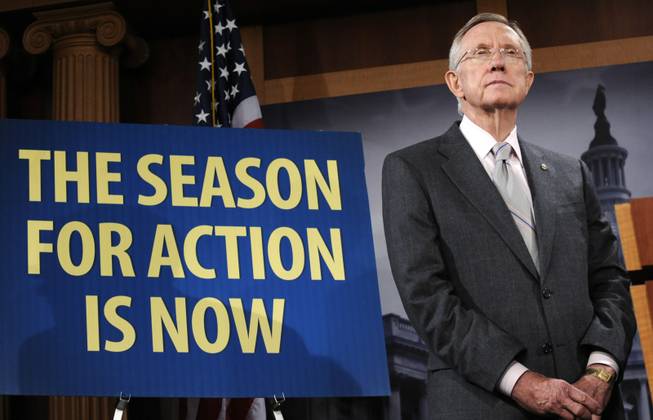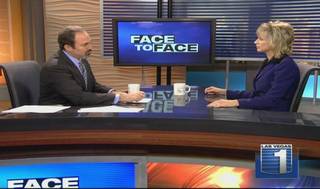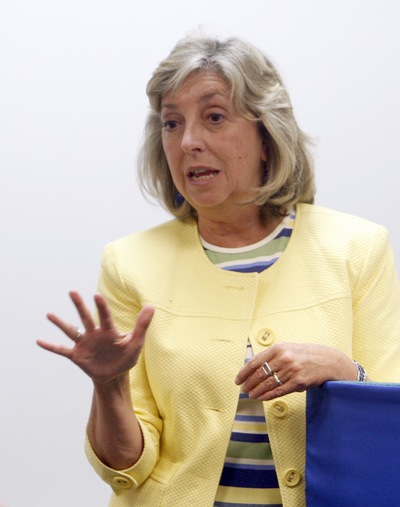
AP Photo/Susan Walsh
Senate Majority Leader Harry Reid takes part in a news conference on Capitol Hill in Washington, Thursday, Sept. 10, 2009.
Thursday, Nov. 5, 2009 | 2 a.m.
Sun Coverage
Sun Blog
Even before the polls closed in far-flung New York, New Jersey and Virginia, the spin was under way deciphering what Tuesday’s results could mean for Nevada’s political landscape in 2010. ¶ The 2009 contests are the first significant measure of the electoral mood in the Obama era, and both Democrats and Republicans saw advantages they did not want to go unnoticed. ¶ Perhaps most impassioned Wednesday was the spin over what Tuesday means for Nevada’s 3rd Congressional District, where freshman Democratic Rep. Dina Titus will seek to retain her seat and at least two Republican challengers will engage in a primary struggle. ¶ Republicans celebrated their sweep in taking back the governor’s seats in Virginia and New Jersey as a sign that voters — particularly the coveted independents who supported Barack Obama last fall — were making their way back to the party.
The National Republican Congressional Committee sent out a feisty news release that suggested Titus was “shaking in her boots” after awakening to the new landscape shaped by voter discontent with President Barack Obama and Congress.
The committee pointed to the assessment made in The Washington Post that Republicans have an opportunity to peel off Obama independents if they deliver the right message.
“Tuesday’s elections provided the first tangible evidence that Republicans can win their support,” wrote the Post’s political reporter Dan Balz.
Yet what the Republican committee didn’t highlight was the next crucial line in that analysis:
“But Republicans could squander that opportunity if they demand candidates who are too conservative,” the Post said.
This conservative undercurrent always finds a home in Nevada, even if it does not always result in electoral wins. Internal party battles in the Republican primaries could play out in two high-profile 2010 races — for the 3rd Congressional District and U.S. Senate.
Foggy Air? - Soul Survival

Viewing video requires the latest version of Adobe's Flash Player
Democrats seized on this point Tuesday night from New York’s 23rd Congressional District. There, the Sarah Palin-backed conservative candidate drew such support that the moderate Republican dropped out, handing the seat to a Democrat for the first time in more than 100 years.
The Democratic Congressional Campaign Committee sees a similar cannibalizing effect taking shape in Nevada’s 3rd District.
There, conservative Republican Rob Lauer is challenging Republican former state Sen. Joe Heck, setting up what Lauer, a real estate investor who moved to Nevada from California for lower taxes in 2004, calls a “battle” for the soul of the state’s Republican Party.
Heck and Lauer have been making the rounds in Washington this week, seeking national support for their campaigns.
“We’re going to have a good, robust campaign this year for the primary, and I think it’s going to be good for the party,” Lauer said.
When Lauer calls himself “a conservative first, a Republican second,” Democratic campaign committee spokesman Andrew Stone hears “echoes of what we heard from tea party activists in New York.”
But New York is not Nevada, and in Southern Nevada’s 3rd Congressional District, independents have ruled the ballot box since its creation in 2002.
As political analyst Jon Ralston reminded in his Wednesday column in the Las Vegas Sun, just as Nevada’s Democrats are not as liberal as those in other states, its Republicans are not as passionate as tea baggers elsewhere.
Case in point: Republican Dean Heller survived a well-funded primary challenge from conservative Sharron Angle for the open 2nd Congressional District in 2006. If Republican primary voters in that mostly rural and Republican district declined to choose the more conservative candidate then, would primary voters in the more suburban and independent-minded Southern Nevada district send the conservative to face Titus in 2010?
Another interesting lesson for Nevada was found in New Jersey Gov. Jon Corzine’s defeat for a second term.
Corzine had an approval rating as low as Senate Majority Leader Harry Reid does in Nevada, and he lost in a state that, like Nevada, still supports Obama.
Analysts said Corzine failed to win the independents — the coveted center that Reid must capture to boost his standing in Nevada — and did not mobilize the Obama crowds from last fall.
Reid’s campaign on Wednesday dismissed the suggestion that it had been monitoring the Corzine race, as had been reported, and said the regional results offer few lessons for Nevada.
“Nevada is not New Jersey and it is not Virginia,” campaign manager Brandon Hall said.
Yet Republicans seized on the East Coast results as hints of political change that could bode well for them in Nevada.
Midterm elections tend to be unkind to the party in power, but if Tuesday offers one lesson, it is that both parties face challenges heading forward in 2010.

